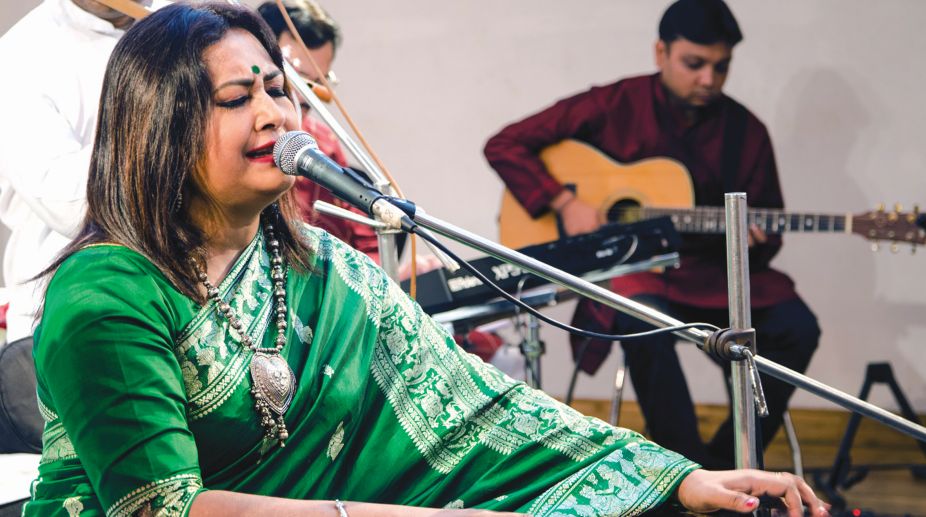My art is my therapy, says artist Neeraj Bakshi
Bakshi says animals have a special role in his theatre, as they seem to connect directly with the observer as the ardent human self, ‘breaking the fourth wall’.
Singer Riddhi Bandyopadhyay presented her solo performance titled ‘Pancho Kobir Konya’ depicting the diversity of Bengal’s lyrical culture in its entirety.

Riddhi Bandopadhyay performing.
It won’t be wrong to say that the celebration of Bengal’s vast poetic tradition is limited mostly to Rabindranath Tagore while there are also Kazi Nazrul Islam, Atul Prasad Sen, Dwijendralal Ray and Rajanikanta Sen. Each of their songs and poems equally strike the chords of our deeper emotions, philosophies and passionately glorifies our beautiful land.
Singer Riddhi Bandyopadhyay has dedicated herself in extensively researching the lives and works of not only these poets but also old timeless songs from Bengal’s rich theatre tradition which is a genre in itself.
Recently, to mark her two-decade-long musical journey, she presented the audience with her solo performance titled “Pancho kobir konya” at the ICCR, Kolkata. Her presentations went beyond Tagore songs and depicted the diversity and richness of Bengal’s poetic culture in its entirety.
Advertisement
“As I stand here today and look back at the 20 years of my life, I realise the importance of focus and determination. Many have been discouraging about my work, questioning its scope for recognition or profitable outcomes. It was a bitter sweet journey,” said Bandyopadhyay.

The programme began with chorus presentations of Rajanikanta geeti Sunao Tomar Amrito Bani and Dwijendrageeti Bela Boye Jaye by Bandyopadhyay’s students. In the first half, Bandopadhyay sung five songs, each by the legendary poets. These included Rabindrasangeet Amar Bhanga Pother Ranga Dhulaye; Atulprasadi Apon Kaje Achol Hole, K Abar Bajaye Banshi and Ami Badhinu Tomar Teere; Dwijendrageeti Patitoddharini Gange; Rajanikanta geeti Ami Akriti Odhom and Nazrul geeti Timiro Bidari.
“Of all the five poets, I am a bit more inclined towards Atul Prasad Sen. His different kind of life, which was almost cinematic, inspires me a lot. His songs communicate to my soul. Unfortunately, when the songs of these three poets are sung, most of the times they are separated by a third bracket ‘Dwijendra-Rajani-Atul’. But each of them belongs to completely different genres.
Sen’s songs have a touch of Lucknow thumri translated into Bengali. Dwijendrageeti has a western influence while Rajanikanta geeti speaks of ultimate submission and has similarity with Tagore’s songs in many ways. In my 20 years of work, I am still searching for the answer to why these three unparalleled artists have always been typecast and sidelined,” said Bandyopadhyay.

In the second half, she presented Ramnidhi Gupta’s tappa, popularly known in Bengali as Nidhu Babu’r tappa, which is a genre as old as 200 years and Tagore was heavily inspired by it. The song she presented is called Se Jodi Na Kore Ador, speaking about the passions of unrequited love.
Chhaya Devi’s Chhal Kore Jal Ante Aami was another song in tappa thumri, rich in intricate tonal patterns suggesting dramatic gestures and mild erotica. Devi was an A-grade thumri-tappa artist, most popular in radio but she never got her deserved recognition. This was one of the two songs from Tapan Sinha’s Harmonium (1976), the only film she has ever sung for.
Her other songs included Angurbala Devi’s Amar Jibon Nodir Opare and another timeless work Ekdin Ami Jabo Bandhu, conveying of desolate emotions that were even more heightened by a beautiful flute accompaniment. With her strong and overwhelming voice, Bandopadhyay’s presentations managed to uphold the picturesque mythological and rural Bengal as clear as crystal before the audiences’ eyes.
Advertisement